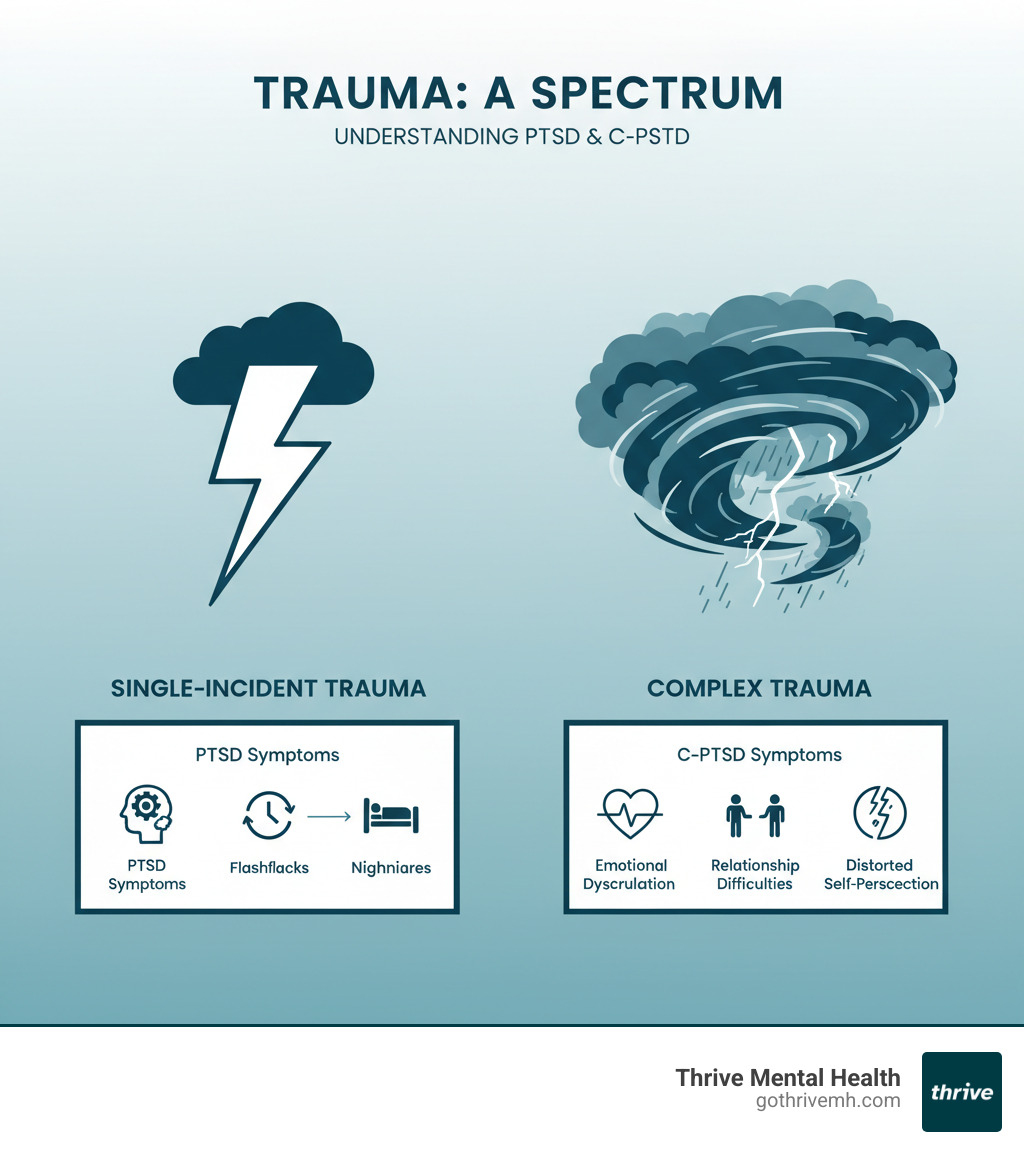Complex Trauma Explained – Navigating the Maze of Chronic Trauma

Complex Trauma: Unveiling Hope 2025
When Trauma Becomes a Way of Life
Complex trauma isn’t a single terrible event. It’s the result of repeated traumatic experiences over months or years, often when you can’t escape. Unlike the flashbacks we associate with PTSD, complex trauma rewires how you see yourself, manage emotions, and connect with others.
Key Facts About Complex Trauma:
- Definition: Repeated, prolonged trauma that’s often interpersonal and inescapable.
- Prevalence: Affects 3-8% of the population worldwide.
- Causes: Childhood abuse, domestic violence, human trafficking, war, chronic neglect.
- Core Impact: Goes beyond PTSD symptoms to affect emotional regulation, self-image, and relationships.
- Recovery: Treatable with specialized, phased approaches and trauma-informed care.
If you’ve experienced chronic trauma, you might struggle with intense emotions, find it hard to trust others, or feel fundamentally broken. The reality is that complex trauma changes how your brain functions. But it’s crucial to understand: these are not character flaws. They are normal responses to abnormal circumstances.
As a trauma therapist at Thrive Mental Health, I’ve helped many people heal from complex trauma using evidence-based approaches like EMDR. This condition requires specialized care that addresses not just the symptoms, but the fundamental ways trauma has shaped your nervous system and sense of self.

Complex trauma further reading:
What Is Complex Trauma and How Is It Different From PTSD?
Think of the difference between being struck by lightning (a single traumatic event) and living through a months-long storm (prolonged trauma). That’s the core distinction between PTSD and complex trauma.
Post-Traumatic Stress Disorder (PTSD) typically follows a single terrifying event. Complex trauma, or Complex PTSD (C-PTSD), develops from repeated traumatic experiences over months or years, especially when escape is impossible. This includes situations like childhood abuse, domestic violence, or human trafficking.
The nature of complex trauma makes it particularly devastating:
- It’s interpersonal: The harm is usually inflicted by people who were supposed to be safe, shattering one’s ability to trust.
- It involves feeling trapped: Unlike a single event with a clear “after,” complex trauma leaves the nervous system in a constant state of high alert because the threat is ongoing.
- It has a developmental impact: When it occurs in childhood, chronic trauma rewires the developing brain, affecting stress regulation, self-perception, and relationship skills.
While both PTSD and C-PTSD share symptoms like flashbacks and hypervigilance, complex trauma creates additional, more pervasive challenges.
| Symptom Category | Classic PTSD Symptoms | Additional C-PTSD Symptoms |
|---|---|---|
| Re-experiencing | Flashbacks, nightmares, intrusive thoughts | More pervasive, triggered by subtle cues, constant sense of threat |
| Avoidance | Avoiding trauma-related places, people, activities | Broader avoidance of emotions, relationships, self-reflection |
| Hyperarousal | Easily startled, irritable, sleep problems, hypervigilance | Chronic hypervigilance, constant “on edge” feeling |
| Emotional Dysregulation | Intense anxiety, irritability | Extreme mood swings, difficulty managing anger, chronic sadness, emotional numbness |
| Distorted Self-Perception | Negative self-talk about the event | Persistent shame, guilt, worthlessness, feeling fundamentally “broken” |
| Relationship Difficulties | Withdrawal, difficulty trusting | Chronic distrust, fear of intimacy or abandonment, repeating unhealthy patterns |
The additional symptoms—emotional dysregulation, distorted self-perception, and relationship difficulties—are the core areas that separate C-PTSD from traditional PTSD. Recognizing complex trauma is key because it often requires a more comprehensive healing approach than standard PTSD treatments.
If you’re looking to understand trauma basics, our Beginners Guide to Understanding Trauma offers a helpful starting point. The mental health charity Mind has more information about complex PTSD that can provide additional insight into this condition.
The Deep Roots: Common Causes and Risk Factors
Complex trauma grows from ongoing situations where escape feels impossible. The wounds often originate in childhood and within relationships that should have been safe.

Common causes include:
- Childhood Abuse and Neglect: When a caregiver is the source of harm (physical, emotional, sexual) or neglect, a child’s developing brain learns that the world is fundamentally unsafe. This emotional starvation or betrayal creates lasting impacts.
- Domestic Violence: For adults, the cycle of abuse in an intimate relationship creates a psychological prison. The abuser often uses control and isolation, making escape feel more dangerous than staying.
- Human Trafficking: This extreme form of captivity combines physical and psychological manipulation with repeated violation, leading to profound trauma.
- War or Genocide: Prolonged, inescapable violence fundamentally alters a civilian’s view of the world and their safety within it.
- Disrupted Attachment: Even without overt abuse, an inconsistent or neglectful caregiver can prevent a child from forming secure attachment, which is the foundation for healthy emotional regulation and relationships. This is a form of betrayal trauma.
The common thread in all these experiences is powerlessness. The inability to escape transforms trauma from a single event into a way of life. As Dr. Nadine Burke Harris explains in her TED Talk on how childhood trauma affects health, these experiences rewire the brain and body. Understanding these roots is the first step toward healing.
The Invisible Wounds: Symptoms and Impact on Daily Life
Complex trauma leaves invisible wounds that reshape how you think, feel, and connect with the world. These symptoms are not character flaws; they are your nervous system’s attempt to protect you.

Core Symptoms of Complex Trauma
Beyond standard PTSD symptoms, complex trauma involves:
- Emotional Dysregulation: Intense mood swings, explosive anger, or emotional numbness that feels uncontrollable.
- Dissociation: “Spacing out,” feeling detached from your body, or having memory gaps as your mind’s escape hatch from overwhelming reality.
- Distorted Self-Perception: A harsh inner critic that fuels deep feelings of shame, guilt, and worthlessness, making you feel fundamentally broken.
- Somatic Symptoms: The body holds onto trauma, leading to chronic headaches, unexplained pain, digestive issues, and constant fatigue. Hypervigilance (always being “on guard”) adds to this physical exhaustion.
Our guide on How PTSD Impacts Daily Life explores these symptoms further.
How Complex Trauma Affects Your Sense of Self and Relationships
The most profound impact of complex trauma is on your relationship with yourself and others. When trauma occurs within key relationships, it creates deep confusion about your identity and worthiness of love.
- Identity Confusion: You may struggle to know what you truly want or need, having buried your authentic self under survival strategies.
- Chronic Distrust: Your brain learns that even people who claim to care can cause harm, making it hard to trust anyone. This creates a push-and-pull between wanting closeness and fearing vulnerability.
- Fear of Intimacy or Abandonment: You might push people away to avoid being hurt or cling desperately to avoid being left, often creating the very outcome you fear.
- Repeating Unhealthy Patterns: You may find yourself drawn to relationships that feel familiar but are harmful, recreating the chaos you grew up with.
- Feeling Fundamentally Different: This creates profound loneliness, as if everyone else received a life manual that you missed.
These patterns can change with the right support. Understanding your emotional landscape is the first step, which we cover in Understanding and Navigating the Emotional Landscape of PTSD.
The Path to Healing: Evidence-Based Treatments and Coping
If you are having thoughts of harming yourself or are in crisis, please call or text 988 to connect with the Suicide & Crisis Lifeline immediately. You are not alone.
Here’s what I want you to know right away: healing from complex trauma is absolutely possible. It is a journey, not a quick fix, but it’s one filled with hope and the real possibility of profound recovery. Many people don’t just survive; they build deeply fulfilling lives. It is never too late to begin.

Professional Treatment for Complex Trauma
Complex trauma requires a specialized, phased approach to rebuild a sense of safety before processing traumatic memories.
- Phase 1: Safety and Stabilization. The focus is on feeling safe in your body and life. This involves learning skills to manage overwhelming emotions, handle dissociation, and set healthy boundaries.
- Phase 2: Remembrance and Mourning. Once you have foundational skills, you can begin processing traumatic memories in a safe, controlled way with a therapist.
- Phase 3: Reconnection and Integration. This phase is about rebuilding your life, developing a clearer sense of self, improving relationships, and finding new meaning.
Several trauma-focused therapies are highly effective:
- EMDR (Eye Movement Desensitization and Reprocessing): Helps your brain process distressing memories so they lose their emotional charge. Learn more in our guide to EMDR Therapy Techniques.
- CBT and DBT: Trauma-focused Cognitive Behavioral Therapy (CBT) helps change negative thought patterns. Dialectical Behavior Therapy (DBT) is powerful for emotional dysregulation and relationship difficulties.
- Somatic and IFS Therapies: Somatic (body-based) therapies address how trauma is held in the body. Internal Family Systems (IFS) helps different “parts” of you (like a wounded inner child) heal and work together.
For many, structured programs like Intensive Outpatient Programs (IOP) and Partial Hospitalization Programs (PHP) offer the comprehensive care needed. These programs integrate individual and group therapy, skills training, and more. The Benefits of a Virtual IOP shows how this intensive care can be accessed flexibly.
Coping Strategies and Building a Support System
Daily coping strategies are essential for building resilience.
- Grounding Techniques: Use the 5-4-3-2-1 method (name 5 things you see, 4 you touch, etc.) to pull your nervous system back to the present.
- Mindfulness and Breathing: Simple exercises like 4-7-8 breathing can reset your nervous system.
- Gentle Movement: Since the body keeps the score, activities like yoga, tai chi, or stretching can be healing.
- Self-Care and Boundaries: Prioritize sleep, nutrition, and movement. Learning to say “no” and protect your energy is crucial for regaining a sense of safety.
- Build a Support System: Connect with trusted friends, family, or peer support groups. Help them understand your needs so they can support your journey.
Our guide on Managing Trauma and Its Triggers offers more practical tools. Healing isn’t linear, but with the right support, you can build a life of meaning and joy.
Frequently Asked Questions about Complex Trauma
Can you fully recover from complex trauma?
Recovery from complex trauma is absolutely possible, though it’s important to understand it as a journey rather than a destination. While C-PTSD can be a lifelong condition for some people, specialized treatment can dramatically reduce symptoms, improve your daily functioning, and help you build a genuinely fulfilling life.
The change many survivors experience is remarkable. With proper support, people develop incredible resilience and learn to live rich, meaningful lives that extend far beyond their trauma history. The goal isn’t to erase what happened – that’s impossible and not necessary. Instead, healing means integrating your experiences and moving forward with newfound strength and wisdom.
Many survivors describe feeling more authentic, compassionate, and connected to others after treatment than they ever thought possible. Your trauma doesn’t disappear, but it stops controlling your life. You learn to carry it as part of your story without letting it write your future chapters.
What is the main difference between C-PTSD and Borderline Personality Disorder (BPD)?
This is one of the most common questions we hear, and for good reason – complex trauma and BPD share many overlapping symptoms. Both conditions involve emotional dysregulation, turbulent relationships, and intense inner pain. However, there are key differences in how they’re understood and diagnosed.
The primary difference lies in their origins and diagnostic criteria. C-PTSD is, by definition, caused by chronic trauma. Every case traces back to prolonged, inescapable traumatic experiences. While many people with BPD also have trauma histories, trauma isn’t required for a BPD diagnosis.
BPD typically centers around core identity disturbance, chronic feelings of emptiness, and an overwhelming fear of abandonment that may exist independently of specific traumatic events. C-PTSD, on the other hand, focuses on how prolonged trauma specifically impacts your sense of self (leading to shame and guilt), your ability to regulate emotions, and your capacity for healthy relationships.
Think of it this way: BPD might develop from various factors including genetics, brain chemistry, and environment, while complex trauma is always rooted in what happened to you over time. The symptoms may look similar on the surface, but understanding the underlying cause helps guide the most effective treatment approach.
How do I find help for complex trauma in Florida?
Finding the right help for complex trauma can feel overwhelming, but there are clear steps you can take. The most important thing is looking for therapists or programs that are specifically “trauma-informed” and have explicit experience with C-PTSD. Not all mental health professionals have this specialized training, so it’s worth asking directly about their background.
In Florida (including major areas like Miami, Orlando, Tampa, and Jacksonville), you’ll find various options. However, location doesn’t have to limit your choices anymore. Virtual Intensive Outpatient Programs like those offered by Thrive Mental Health provide access to specialized complex trauma care regardless of your exact location within the state.
When evaluating programs, always verify they accept your insurance coverage. Major providers like Cigna, Optum, Florida Blue, and others often cover trauma-focused treatment, but benefits can vary. Most reputable programs will help you verify your coverage before you commit to anything.
Look for programs that offer a phased approach to treatment and multiple therapeutic modalities like EMDR, DBT, or trauma-focused CBT. The flexibility of virtual programs can be particularly helpful for complex trauma survivors, allowing you to access care from the safety of your own environment while still receiving intensive, expert-led support.
Take the First Step Toward Healing
Living with complex trauma can feel like carrying an invisible weight that no one else understands. The shame, the hypervigilance, the difficulty trusting others – it can make you feel profoundly alone and convinced that something is fundamentally wrong with you. But here’s what I want you to know: you are not broken, and you are definitely not alone.
What you’ve experienced – those repeated betrayals, the chronic stress, the feeling of being trapped – these created very real changes in your brain and nervous system. But just as your brain adapted to survive those impossible circumstances, it can also learn new patterns of safety, connection, and healing.
Understanding the roots and symptoms of your experience, as we’ve explored in this guide, is truly the first crucial step. You’re already showing incredible courage by seeking information and recognizing these patterns in your own life. That awareness? It’s the foundation everything else builds on.
The next step is reaching out for expert, compassionate support – and that can feel terrifying when trust has been shattered. At Thrive Mental Health, we understand this paradox. Our team of trauma specialists provides evidence-based care specifically designed for complex trauma, using approaches like EMDR, DBT, and trauma-focused therapy within our virtual and hybrid intensive programs.
What makes our approach different is the flexibility and intensity. Traditional once-a-week therapy often isn’t enough for complex trauma – you need more comprehensive support as you steer this healing journey. Our virtual and hybrid IOP/PHP programs allow you to access specialized care from the comfort of your own environment, with evening options that work around your life. Whether you’re in Miami, Orlando, Jacksonville, or anywhere else in Florida, expert trauma care is accessible.
You don’t have to figure this out alone anymore. Your nervous system has been on high alert for so long – it’s time to give it the specialized support it needs to finally feel safe.
Ready for support? Thrive offers virtual and hybrid IOP/PHP with evening options. Verify your insurance in 2 minutes (no obligation) → Start benefits check or call 561-203-6085. If you’re in crisis, call/text 988.